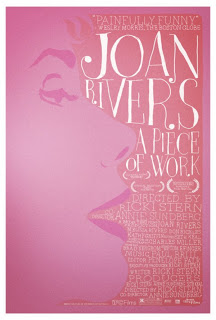Most reviews of the documentary
Joan Rivers: A Piece of Work begin by describing how the film opens–with a close-up shot of Rivers’ face, without make-up. This is, of course, a metaphor for the goal of the film (to get behind the facade) and an acknowledgment of what Rivers has come to be most famous for–her surgically-altered appearance. While her face is surely a piece of surgical work, the far more fascinating work is that of her long life in the spotlight, and her drive to keep going, keep performing, keep selling, when the culture tells her she should stop (or that she should have stopped long ago).
I went into this film feeling ambivalent. On the one hand, it’s a documentary about an extraordinary woman, made by two women–
Ricki Stern and
Anne Sundberg, who are known for their previous films
The End of America
,
The Devil Came on Horseback
, and the forthcoming
Burma Soldier, among others. It’s about a mouthy broad (and I love mouthy broads, women who speak their minds and aren’t afraid to put themselves out there), who is funny, and who has been at it since 1966. On the other hand, it’s yet another film about a wealthy white woman (I just watched and reviewed
The September Issue, about Vogue editor-in-chief Anna Wintour) who lives like “Marie Antoinette, if she’d have had money.” Though I enjoy most of her comedy, I–like many others–had come to see her primarily through her surgically-altered appearance, her anything-for-a-buck business approach (A comedy icon selling jewelry on QVC? Starring on
Celebrity Apprentice?), and her less-than-feminist years hosting the red carpet.
Watching the film, however, gave me a new appreciation for Rivers–even while not sharing a number of her perspectives. A Piece of Work documents a year in Rivers’ life: she turns 75, faces down a heckler at a stand-up show in Wisconsin, honors George Carlin in a tribute, gets roasted by Comedy Central, and injects new life into her career by winning Celebrity Apprentice. All while still selling that damn jewelry. Her energy level is astounding, and I wonder how she manages to do all she does at the age of 75.
Rivers is an odd character. Being a superstar female comic alone is odd in the U.S.–only a few came before her–but we get a very real look at her life, at the troubles she has faced (her husband’s suicide) and continues to face, and at the loneliness that certainly helps her drive to fill her daily calendar. She is vulnerable and still nervous when going on stage, especially when pursuing what she calls the one sacred part of her life–her acting–in which she hasn’t seen a lot of personal success. I came to find her more compelling and interesting than my initial perception of her, and encourage anyone to see this film and learn more about a woman who refuses to stop.

